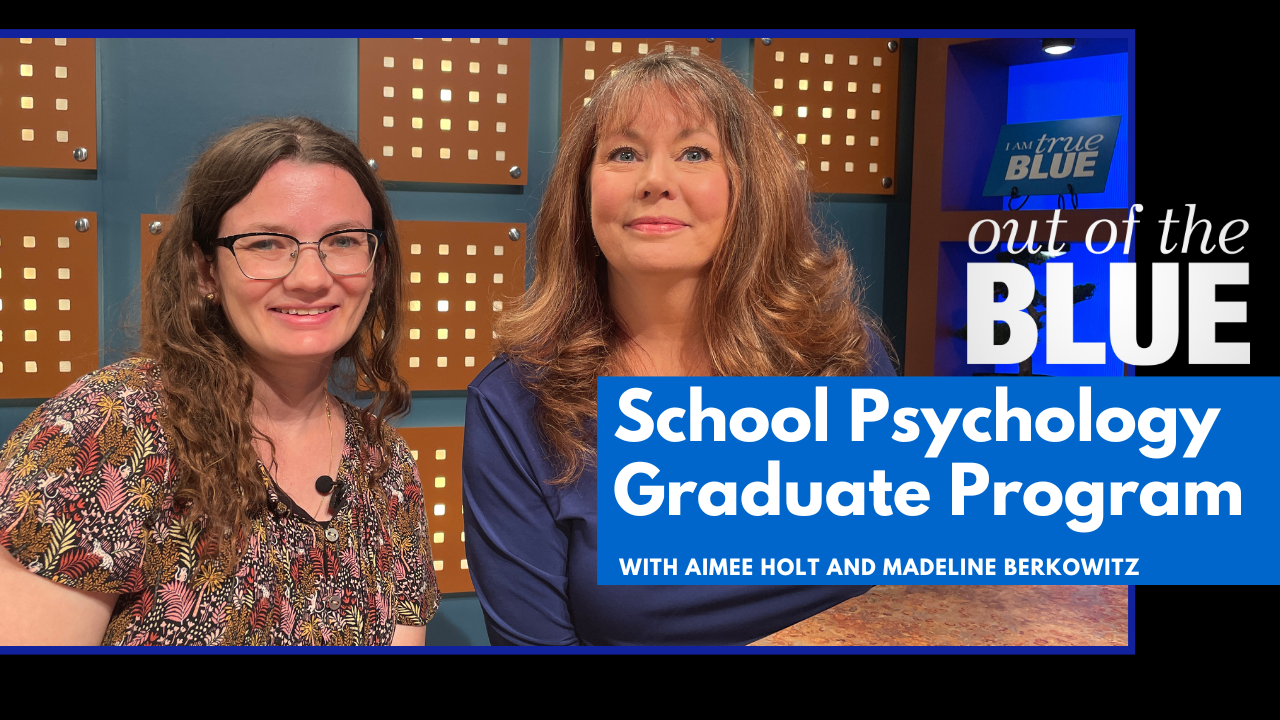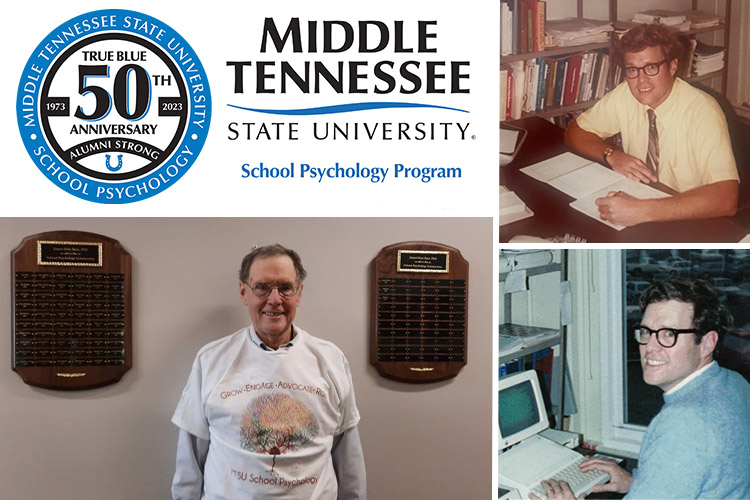
Psychology
Become a licensed School Psychologist and prepare for a rewarding career supporting students' academic and emotional needs.
Psychology, Pre-Specialist in Education: School Psychology Concentration, M.A.
School Psychologists work in collaboration with teachers, parents, and other school personnel to meet the academic, social, behavioral, and emotional needs of students in grades from pre-school to high school. The School Psychology program at Middle Tennessee State University offers a combined M.A. and Ed.S. program that leads to licensure as a School Psychologist through the Tennessee Department of Education.
The School Psychology program (combined M.A./Ed.S.) curriculum entails 66 credit hours of on-campus courses, school-based practica, and a year-long capstone internship in the schools. The M.A. portion of the program comes first. The Ed.S. is an advanced degree. It is only available to students who have Master’s degrees in School Psychology. Transfer students from other Master’s programs in Psychology or Counseling may apply, but they will be required to complete deficiencies from the Master's (M.A.) portion of the School Psychology program.
Courses and fieldwork components prepare graduates of the program to provide evidence-based assessment, consultation, and intervention services in a school setting. The National Association of School Psychologists (NASP) first approved the program in 1991 and 2023 marked the program's 50th anniversary.
Watch Dr. Aimee Holt and Dr. Madeline Berkowitz discuss the program on MTSU's "Out of the Blue"
Starting Internships and New Jobs!!
2025-2026 Internship Placements:
- Jackson-Madison County Schools (1) - Project RAISE
- Lauderdale County Schools (1) - Project RAISE
- Metro Nashville Public Schools (1)
- Sumner County Schools (1)
- Tipton County Schools (1) - Project Raise
- Williamson County Schools (1)
2025-2026 Graduate Job Placements:
- Bedford County Schools (1)
- Dixon County Schools (2)
- Maury County Schools (1)
- Metro Nashville Public Schools (1)
- Sumner County Schools (1)
- Williamson County Schools (1)
News Briefs

October ‘Out of the Blue’ spotlights MTSU’s School Psychology graduate program
In the October edition, Middle Tennessee State University’s “Out of the Blue” television magazine program spotlights the School Psychology graduate program in the College of Behavioral and Health Sciences, which just celebrated 50 years.[ Read More ]

MTSU School Psychology Program celebrates 50th, honors founding professor
A Middle Tennessee State University graduate program that ultimately has impacted thousands of students across the nation turns 50 this year. To celebrate its founding — and its founder — the MTSU School Psychology Program hosted an open house earlier this month to honor Professor Emeritus James “Jim” O. Rust, who spent 48 years at [ Read More ]
News Briefs

October ‘Out of the Blue’ spotlights MTSU’s School Psychology graduate program
In the October edition, Middle Tennessee State University’s “Out of the Blue” television magazine program spotlights the School Psychology graduate program in the College of Behavioral and Health Sciences, which just celebrated 50 years.[ Read More ]

MTSU School Psychology Program celebrates 50th, honors founding professor
A Middle Tennessee State University graduate program that ultimately has impacted thousands of students across the nation turns 50 this year. To celebrate its founding — and its founder — the MTSU School Psychology Program hosted an open house earlier this month to honor Professor Emeritus James “Jim” O. Rust, who spent 48 years at [ Read More ]
Related Media

Psychology, Pre-Specialist in Education: School Psychology Concentration, M.A.
Graduates from our combined M.A./Ed.S. program work in education as school psychologists.
Employers of MTSU alumni include
- Bedford County Schools
- Carrollton Farmers Branch Independent School District, Carrollton Texas
- Cartersville (Ga.) Schools
- Cave City (Ark.) School District
- Coffee County Schools
- Dickson County Schools
- Garfield Heights City Schools, Cleveland, Ohio
- Knoxville City Schools
- Lewis County Schools
- McMinn County Schools
- Metro-Nashville Public Schools
- Murfreesboro City Schools
- Rutherford County School
- Sumner County Schools
- Tennessee Department of Education
- Toole County School District, Utah
- Vancouver (Wash.) Public Schools
- Warren County Schools
- Widefield District 3, Colorado Springs, Colorado
- Williamson County Schools
- Wilson County Schools
Recent Internship Placements
2024-2025
- Bedford County Schools (1) – Project RAISE
- Dixon County Schools (2)
- Maury County Schools (1) – Project RAISE
- Sumner County Schools (2)
- Williamson County Schools (1)
Recent Employers
2024-2025
- Carrollton Farmers Branch Independent School District, Carrollton Texas (1)
- Metro Nashville Public Schools (2)
- Murfreesboro City Schools (1)
- Rutherford County Schools (1)
- Sumner County Schools (1)
- Williamson County Schools (2)

MTSU’s Career Development Center
MTSU offers a comprehensive Career Development Center that serves students throughout the full student experience and beyond. They collaborate with faculty and staff to equip students with the tools to be marketable to the world of work and continuing education.
Students can schedule an appointment or check online resources and job boards at mtsu.edu/career.
Students can find current internship opportunities by talking to faculty and visiting the University job and internship board called Handshake.
Wondering what you can do with your major? Check out our What Can I Do with A Major In guides.



Associated Links
- National Association of School Psychologists
- Data Base of School Psychology Programs
- Tennessee Association of School Psychologists
Sources for Funding
- Graduate Assistantship Program & Application (MTSU)
- Scholarships, Research Awards, and Loan Forgiveness (NASP)
- Funding Opportunities for Graduate Students (NASP)
What is a school psychologist?
A school psychologist is interested in the translation and implementation of Psychological knowledge within the school system. This implies that psychology is the core of the student’s training and the foundation upon which professional development will occur. Such a conception demands that the psychologist draw upon a number of specialty areas such as professional education, educational psychology, clinical and child psychology, curriculum design, developmental psychology, social psychology, and the experimental analysis of behavior.
What is the school psychologist’s function in the educational environment?
The school psychologist does not apply skills in a vacuum, but in the context of an educational system containing other professionals. Therefore, the psychologist must have a realistic understanding of the functions, methods, and problems of the school, and be especially appreciative of the role of the classroom teacher as well as other special staff members carrying on related functions (e.g., the counselor, speech therapist, special education teacher, etc.). The school psychologist is involved in consultation, assessment, intervention, prevention, educational development, research, and planning.
What educational factors are common issues for school psychologist?
Many unique situations are contained within the general learning environment. The major psychosocial factors to be considered in any situation include, the child, the teacher, other children, the family and the specific cultural environment. These will directly affect the other factors and exert major influences on the learning and behavior of any given child. To deal with the relation of these factors, the school psychologist will need to be familiar with two areas: (1) psychological theories including intervention theories, cognition and personality paradigms, assessment and evaluation procedures, methods of communication, and so on; and (2) the structure and organization of public schools, particularly the practical aspects of day-to-day instruction and the problems teachers encounter.
What is the goal of education?
The school psychologist recognizes that the ultimate goal of education is to provide all pupils with opportunities for maximal intellectual, educational and interpersonal growth so that they may live full and satisfying lives as contributing members of a diverse society. Clearly, the pupil is the cornerstone of attention for everyone. With special training in inter- and intra-personal behavior, and an appreciation for the contributions of diverse groups, the school psychologist is in a unique position to recognize and deal with many variables within the school system that contribute to the child’s development (i.e., the teacher, the administration, peers, class and program placement, specific situations, and so on.)
What is the School Psychology program like at MTSU?
The School Psychology program at Middle Tennessee State University is field-based. The purpose of the program is to educate Ed.S. level school psychologists for licensure by the Tennessee Board of Education. Graduates also are eligible to apply for designation as a Nationally Certified School Psychologist. Students typically earn the M.A. degree after the first year and a half of study and the Ed.S. at the end of their third year.
What type of theory does the MTSU school psychology program use?
The School Psychology program uses a psychosocial model and promotes a multicultural perspective. The program sees the child as a unique individual always confronting a unique situation. As such, the child can only be understood in the context of both the general factors that contribute to the environment and the specific factors that make up the child’s unique situation. The child’s learning environment is influenced by three major social systems: society in general (including the cultural context), the family situation, and the school system. Differing sets of values, goals, and expectations are possessed by each of these social systems, and their interaction will exert major influences on the child and the classroom. The school psychologist must be prepared to understand and deal with each of these factors.
Related Links
Professional Licensure Disclosure
The combined Master of Arts (M.A.) and Specialist in Education (Ed.S.) in School Psychology at Middle Tennessee State University (MSTU) is approved by the National Association of School Psychologists (NASP) and approved for licensure by the Tennessee Department of Education. Students should be aware that licensure requirements vary from state to state and are subject to change. MTSU has not made a determination whether this program will meet all of the requirements of another US state or territory.
MTSU recommends that students who plan to seek licensure outside the state of Tennessee contact the appropriate licensing agency and discuss their plans with their advisor. To obtain current information about each state’s and territory’s licensure requirements and any additional regulations, students should consult the US Department of Education’s website for state contacts at https://www.ed.gov/contact-us/state-contacts, the NASP listing of state school psychology requirements at https://www.nasponline.org/standards-and-certification/state-school-psychology-credentialing-requirements, and discuss their plans with their advisor.
Graduates of MTSU’s combined MA-EdS program are eligible for the Nationally Certified School Psychologist credential from the National School Psychology Certification Board of the National Association of School Psychologists. Students seeking national certification should consult the NASP website at https://www.nasponline.org/standards-and-certification/national-certification and their advisor.

CONTACT US


















